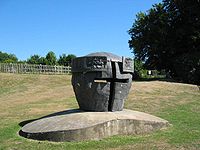Mise of Lewes
| Settlement between King Henry III of England and oppositional magnates | |
|---|---|

1964 monument to the Battle of Lewes
|
|
| Type | Settlement |
| Signed | 14 May 1264 |
| Location | Lewes, Sussex |
| Effective | Immediately |
The Mise of Lewes was a settlement made on 14 May 1264 between King Henry III of England and his rebellious barons, led by Simon de Montfort. The settlement was made on the day of the Battle of Lewes, one of the two major battles of the Second Barons' War. The conflict between king and magnates was caused by dissatisfaction with the influence of foreigners at court and Henry's high level and new methods of taxation. In 1258 Henry was forced to accept the Provisions of Oxford, which essentially left royal government in the hands of a council of magnates, but this document went through a long series of revocations and reinstatements. In 1263, as the country was on the brink of civil war, the two parties agreed to submit the matter to arbitration by the French king Louis IX. Louis was a firm believer in the royal prerogative, and decided clearly in favour of Henry. The outcome was unacceptable for the rebellious barons, and war between the two parties broke out almost immediately.
The Mise of Lewes was signed on the day of Montfort's victory at the Battle of Lewes, though it is not known whether it happened during or after the battle. Neither are the terms of the document known, though it seems clear that they involved conditions for further negotiations. These efforts at a permanent settlement fell through, however, and the support for Montfort's government gradually eroded. Henry's oldest son, Edward – the later King Edward I – started a military campaign that ended in the Battle of Evesham in August 1265, where Earl Simon was defeated and killed. Parts of the baronial resistance still held out, but by the end of 1266 the final besieged garrison at Kenilworth Castle surrendered. The rebels were given pardons according to terms set out in the Dictum of Kenilworth.
By 1264, the reign of Henry III was deeply troubled by disputes between the king and his nobility. The conflict was caused by several factors: the influence of foreigners at court, a wasteful war over the crown of Sicily, and a personal dispute between King Henry and Simon de Montfort, Earl of Leicester. In 1258, Henry was forced to accept the so-called Provisions of Oxford, whereby he effectively surrendered control of royal government to a council of magnates. In 1259 the baronial program of reform was further elaborated upon in the Provisions of Westminster. The provisions remained in effect for three years; it was not until 1261 that Henry was able to move against the opposition. Receiving the papal annulment of the provisions his emissaries had campaigned for, he re-assumed control of government. Over the next two years, however, discontent re-emerged over Henry's style of government. He failed to be reconciled with Montfort, and he also alienated Gloucester's son and heir Gilbert. In April 1263 Montfort returned to England after a long stay in France, and reignited the reform movement. On 16 July Henry was surrounded by rebel forces in the Tower of London, and once more forced to accept the conditions of the provisions. Prince Edward – the later King Edward I – now took control of the situation. In October Edward took Windsor Castle, and the baronial alliance started to break up.
...
Wikipedia
